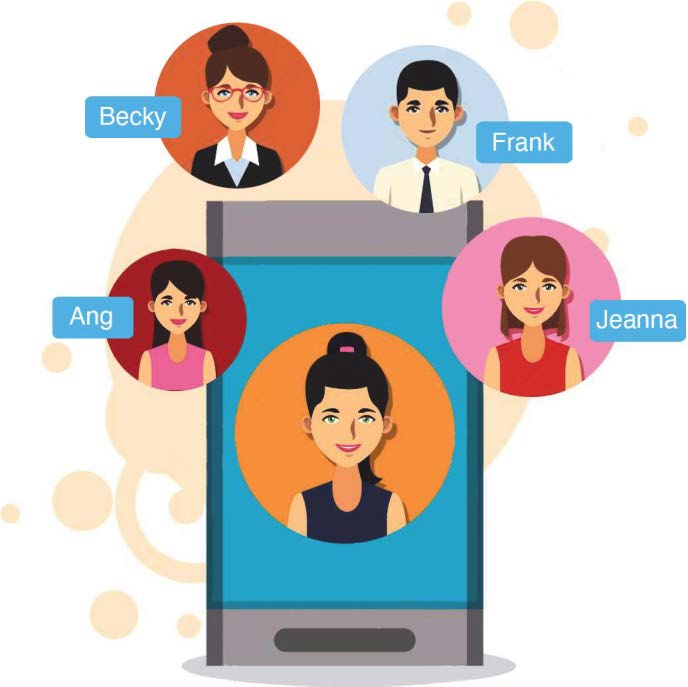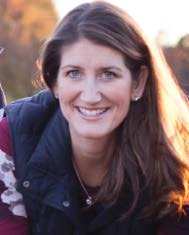PUZZLES & CAMO
SHELLY HUHTANEN
In Case of an Emergency
In Case of an Emergency I have never lived by so many accepting neighbors. I don't think I realized it until I was able to answer the emergency contact question with such confidence. I have my tribe. Feeling a sense of acceptance and knowing you can truly count on people around you are so important.
As a military spouse, I share many experiences in common with other military spouses. It doesn't matter the branch of military in which our life partners serve. One example is the experience of moving. The heartache of leaving friends behind in the hopes of making new ones at the next installation is pretty common. There can be stress involved with packing all of your belongings onto a moving truck and then pleading with the truck driver to go easy over the speed bumps because almost everything you own is on that moving truck. Once you arrive at the new installation, there is a mad rush to find out where to get your haircut, a good dentist, and a doctor for you and your children.
Another issue that is commonly discussed with military spouses is schools. Where are the good schools in the area? As you start to get settled into your new home and eagerly search for your tribe, there is a question that you will eventually need to answer, "Who is the emergency contact for your children if you or your spouse are not available?"
I have heard this question discussed every time I move to a new installation or meet a spouse that has just arrived. When you enroll your child into a new school, the question is on the paperwork. I'll be asked this question at my children's new pediatrician. I have been known to run up to new friends and ask, "Can I put you down as an emergency contact? If so, then you can put me down."
With typical kids, sharing contact info for an emergency contact is pretty common and frankly, almost expected. As the adults are making friends, their typical children are creating friendships as well. Parents of special needs children may not have the same experience. My typical son still talks about the friends he made at past installations, but my special needs son did not transition the same way as his typical brother. Due to the difference in their experiences, the emergency contact list for my typical son has had a tendency to be longer than the list for my special needs son.
Who could I trust to be patient with Broden if he became upset when I wasn't there to pick him up from school or clinic? I was lucky to find one person that I could trust to be there in an emergency for him, but to be truthful, I was still hesitant to provide a name. The circle of trust involving his care is small.
Last week, Broden's BCBA needed to fill out some paperwork that involved emergency contacts. "If there was ever a situation where you and Mark were unable to get Broden, is there a person we could call to be with him?" This time around, I not only had just one person, I had four people. Instead of feeling overwhelmed, I was actually quite excited to answer the question, "Frank, Becky, Jeanna, and Ang!" Broden's BCBA looked up at me and said, "We only have three lines to fill for this question." I told her she needed to squeeze two names on the third line because I wanted all four on Broden's form. I told her that if something happened to Broden, I wanted my tribe there to help.

CIRCLE OF TRUST: I needed to fill out some paperwork that involved emergency contacts. This time around, I not only had just one person, I had four people. "Frank, Becky, Jeanna, and Ang!" I needed to squeeze two names on the third line because I wanted all four on Broden's form.
I have never had a neighborhood quite like this one before. Frank lives on the corner and used to work with children with autism in the schools. When Frank and his wife arrived on the block, I told him about Broden, and he said, "I definitely want to meet your son. I bet he is so cool." If Frank is outside while Broden is walking, Frank will make a point to say hello to him. His boisterous laugh and willingness to reach out and connect with Broden is pretty special. When I asked him if I could rely on him to be Broden's emergency contact, he response was one that I had not heard before. Frank said, "Thank you, it would be my pleasure."
Before the COVID pandemic, Mark and I used to take Broden to the local school football games. Becky and her husband sat with us and would always acknowledge him. If I'm pulled over on the side of the road talking with her and Broden's in the backseat, she will always say hi to him and make sure he knows that he's acknowledged. Jeanna has a mutual friend that has a special needs son. She has always been open about how much she enjoyed spending time with him and said, "Absolutely!" when I asked her about adding her to the list. Ang has talked with me about her working in classrooms with special needs children in the past and how much she enjoyed it. When I asked if she would consider the idea of being on my list she replied, "I would be honored."
I have never lived by so many accepting neighbors. I don't think I realized it until I was able to answer the emergency contact question with such confidence. I have my tribe. Feeling a sense of acceptance and knowing you can truly count on people around you are so important. Being in the military, we have to recreate a circle of trust every time we move. Some installations will have more names than others on our emergency contact lists and that is to be expected, but for a special needs mom to have too many names to fill an emergency contact form is a rare occurrence in my world, but an occurrence I will gladly accept. •
PUZZLES & CAMO

Shelly Huhtanen is an Army wife stationed at Fort Benning, GA who has a child with autism. She enjoys sharing her experiences of day-to-day life caring for her son with autism while serving as an Army spouse. She authored "Giving a Voice to the Silent Many" that encompasses many stories of raising a child with autism in the military. Shelly is passionate about autism advocacy for our military and works to bring awareness to our local legislators and command about providing better support for our military autism community, such as better health care and education.